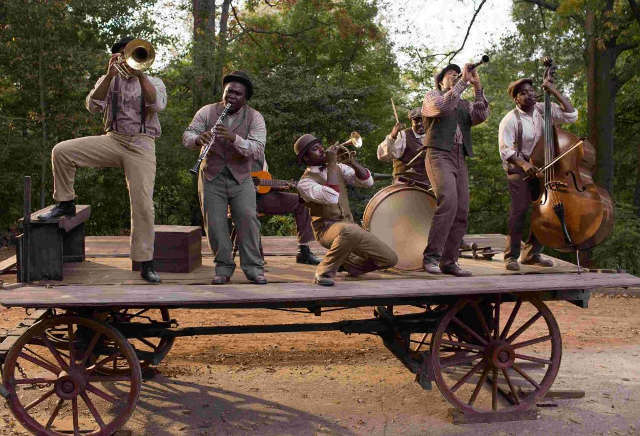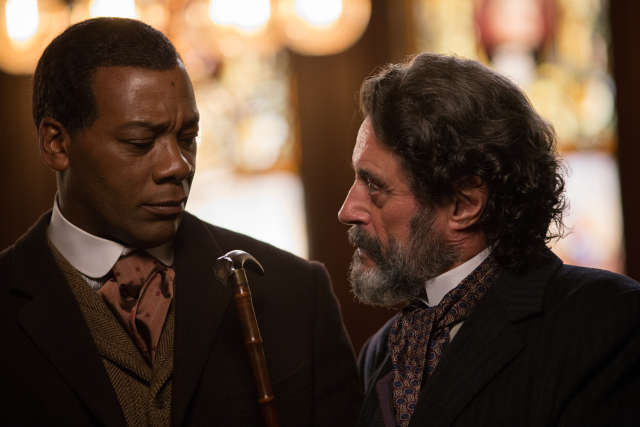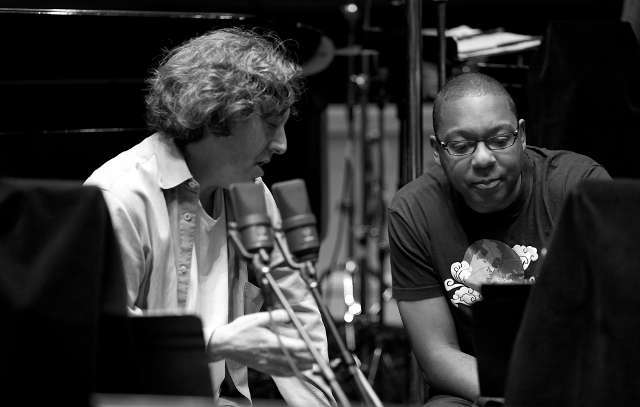Bolden—the movie about the ill-fated New Orleans cornetist Charles “Buddy” Bolden, who pioneered jazz circa 1900—was originally scheduled for release in 2008. Six years later, the film lost its titular star and had to recast that primary role and reshoot countless scenes. In 2010, director Dan Pritzker hoped to have the flick in theaters in 2011. But Bolden!, as it was then known remained mired in post-production for more than a decade.
Along the way, the fledgling film director—an heir to the family fortunes of the Pritzker clan, which owns Hyatt Hotels—released a 70-minute black-and-white silent short called Louis in which young Anthony Coleman plays Louis Armstrong as a child growing up on the outskirts of Storyville.
The atmospheric period piece, which was released nine years ago, is considered a companion piece to Bolden. Louis stars several actors, such as Jackie Earle Haley as a corrupt politician, and Shanti Lowry as a prostitute, in the same roles they play in the feature-length Bolden.

Louis premiered in Chicago August 25, 2010, with live musical accompaniment by Wynton Marsalis, pianist Cecile Licad, and a 10-piece orchestra. That summer, the musicians traveled with the black-and-white film to Detroit, Bethesda, N.Y., and Glenside, Pennsylvania.
Now Bolden is finally scheduled for its theatrical release on May 3. It will be distributed by Abramorama.
Shooting for both movies began in 2007 in North Carolina and continued in 2009 in both North Carolina and New Orleans itself. In 2014, Pritzker had to reshoot more than half of Bolden. At that time, leading man Anthony Mackie (The Hurt Locker) bowed out of the production and was replaced by Gary Carr, who played an American bandleader in the PBS drama Downton Abbey and a 42nd Street pimp in the HBO-TV series The Deuce. (Mackie appears as Bolden in the Louis short.)
While his Bolden script did its best to present a historically accurate portrait of the turn-of-the-century Crescent City and Bolden’s biography, Pritzker admits to engaging in flights of fancy and fantasy, which he calls “mythical wanderings from my imagination.”
Best known as leader and guitarist for the offbeat soul-rock band Sonia Dada, Pritzker had never made a movie before Louis. Yet that novice status has not kept him from attracting an impressive cast of actors and behind-the-camera talent to tell the story of a man Pritzker compares to “a shaman who flipped on the lights.”
A dozen years before he began shooting this movie, Pritzker first learned about Bolden’s life and legend, and soon found that the myth overshadowed the man. The cornetist was born to a working-class family in 1877, but after that the facts become less clear. To fellow “musicianers” who played with or around him, Bolden was among the first to break through accepted musical forms, pushing his group into an often-raucous improvisational style that would become known as jazz.
In the first decade of the 20th century, Bolden ruled the musical roost in New Orleans, playing tunes with titles such as “Funky Butt” and “If You Don’t Shake It, You Get No Cake.” By 1907, however, dementia—likely induced by alcohol—left him unable to function. That year he was committed to an insane asylum in Jackson, Louisiana, where he played his cornet only rarely. Buddy Bolden died there, penniless and forgotten, in 1931.
The music for both of Pritzker’s movies was composed, arranged, and performed by New Orleans native Wynton Marsalis, artistic director of Jazz at Lincoln Center. Marsalis has defended Pritzker against pre-release complaints that he fails to adhere to the facts as known. Marsalis said the director’s fictionalized presentation of Bolden’s and Armstrong’s lives remains within the bounds of artistic license. “It’s not a documentary,” Marsalis explained.
Besides his own original compositions for Bolden, Marsalis rearranged classic jazz tunes such as Jelly Roll Morton’s “Black Bottom Stomp,” Duke Ellington’s “Happy Go Lucky Local,” and Charles Mingus’s “Boogie Stop Shuffle,” along with several pieces by the 19th-century Creole composer Louis Moreau Gottschalk. Composers Mark Isham and Scott Steiner also contributed to the Bolden score.
Marsalis’s soundtrack will be released by Blue Engine Records on April 19, two weeks before the movie comes out.
The disc tracks tunes which defined Bolden’s zeitgeist, including “All the Whores Go Crazy (About the Way I Ride),” “Make Me a Pallet on the Floor,” and, of course, “Funky Butt.”
The soundtrack’s first single, “Timelessness,” is streaming now on Spotify and Apple Music.
The disc showcases vocalists Catherine Russell and Brianna Thomas and instrumentalists including Wycliffe Gordon, Victor Goines, Marcus Printup as Marsalis brings turn-of-the-century New Orleans back to life, imbuing early jazz classics popularized by Bolden and Louis Armstrong with a modern sound and energy.
The Bolden project, which the 60-year-old Pritzker is self-financing, has reportedly cost more than $30 million. But as a billionaire member of Forbes’ list of the 400 richest Americans, Pritzker’s got deep pockets—Forbes lists his net worth as $1.95 billion.
“Obviously, I’ve had a steep learning curve, and I just decided that I wanted to tell the story in a different way than I had captured it,” he told Deadline.com’s Mike Fleming, Jr., in 2014.
“The film starts out in this asylum where Bolden has been living for 24 years, and a radio is turned on and there’s a Louis Armstrong concert being broadcast,” Pritzker said. “It is important that the audience understands this music is the trigger to taking this guy on this cinematic trip, and it opened the door to using some projection techniques and still photography I’ve been working on. They help tell the story quite effectively.”
The Bolden trailer opens with a scene showing Buddy’s mother, Alice, toiling in a garment- making sweatshop in which the whirr of sewing machines and the pumping of feet beneath them mirror the ragged rhythms of early jazz.
Buddy Bolden is often shown wearing a bowler and with a white shirt opened at the collar, but the red undershirts for which he became famous are nowhere to be seen. Aspiring actors portray many of Bolden’s real-life contemporaries, such as trombonist Frankie Dusen, clarinetist Frank Lewis, guitarist Brock Mumford, valve trombonist Willie Cornish, and competing bandleader John Robichaux.
A handful of instantly recognizable actors round out the cast, including Deadwood’s Ian McShane as Judge Perry, The Walking Dead’s Michael Rooker as enforcer Pat McMurphy, Transformers’ Reno Wilson as Louis Armstrong, and Chicago Med’s Yaya DaCosta as Buddy’s wife, Nora.
Catherine Russell plays Lalique Lil in the film, and performs one of Bubby Bolden’s signature songs, “Make Me a Pallet on the Floor”.
To learn more about the movie and see its trailer, visit boldenmovie.com.
More on Bolden
Russ Tarby is based in Syracuse NY and has written about jazz for The Syncopated Times, The Syracuse New Times, The Jazz Appreciation Society of Syracuse (JASS) JazzFax Newsletter, and several other publications.






















